- Home
- Madeleine Roux
House of Furies Page 5
House of Furies Read online
Page 5
I paused at the bottom of the stairs, appreciating the paintings hung in the grand, vaulted chamber. The walls were plaster painted the color of mint, and when I put my hand on the plaster it felt warm to the touch, like it was somehow lit from within. Alive. The paintings were a series of portraits, all of solitary men, all in different stages of life and different locations. Here was a boy, perhaps of ten, posing proudly with a hunting rifle and a dead pheasant. And here was a middle-aged man with a heavy black beard, his boot propped on the railing of a sailing schooner. And there an elderly gentleman in repose in his library.
Down on this subterranean level, I could hear no hint of the goings-on above. It was as if the boardinghouse had ceased to exist.
There was no mistaking it—I was stalling. A familiar sense of panic welled in my throat. Mrs. Canning, the headmistress at Pitney School, had called me before her too many times to count. My fingernails were never clean enough; my gait was too arrogant or too sly. My spelling was too improbably correct. I was always cheating or dawdling, sleeping too late or waking too early, being too helpful or not accommodating enough. She singled me out as her adversary, her project, and from my first day at Pitney she and the teachers had colluded to make my life unstable. I never knew what, precisely, was expected of me. The rules constantly shifted, and therefore I never performed at an adequate level.
My friend Jenny always said they were just jealous because I already knew some French and Latin, and because I took to lessons readily and with a quick mind. But Jenny was always charitable that way. The far more likely explanation was that they simply hated me.
Jenny didn’t believe in such things. Every bad reaction, every act of malice, needed to be justified. But I knew better—some people were simply mean-spirited. The world could be evil and unfair, and the sooner one accepted this idea, the sooner one could get on with the business of surviving. Surviving this time, I thought with a sigh, meant playing the part of a good little scullery maid.
No doubt I would face the same random cruelty from this Mr. Morningside. I tried to resolve my posture and face into the correct combination of obedient and simple. It was always best to be underestimated, and who wouldn’t want a docile, dull, but determined employee?
The vaulted antechamber narrowed toward a hall and another green door. As I neared this door, flattening down my apron, I heard nothing on the other side but the scratching of a quill pen.
I breathed deeply, stilled, and knocked twice on the door.
Go in, be pleasant, leave, return to work. You can accomplish this, Louisa. You can just be normal. You can disappear.
“Come in.”
It was not the voice I expected—not old and gruff but mellow. Perhaps a bit nasal, but not at all mean. I opened the door, finding a round room that reminded me of some kind of cistern. Though I saw no leaks, the place felt warm and wet. Perhaps the spring on the grounds was responsible for the clamminess. I was at once struck by the number of standing birdcages filling the large office. They decorated the place in a semicircle around a long, tall desk. The cages stood at varying heights, each filled with a different bird. Some were simple English things I had seen myself in the country; others wore riotous colors, great crested plumes spilling over their heads. Strangely, it didn’t stink at all of animal, and stranger still, each and every bird was utterly silent, as if . . . commanded. Controlled.
Some noticed me; others groomed themselves, or slept with pointed heads under their wings. The master himself, Mr. Morningside, had noticed me, too. He stood tall and straight behind his desk, his pen down and at rest on a stack of papers. His right hand was tucked into his coat. It reminded me of something Jenny had said at Pitney, that her French aunt had shown her an illustration of Napoléon Bonaparte in the Times and bragged about how handsome and regal he was, standing there with his fingers hidden in the flap of his jacket. A flashy gold pin studded his cravat. And he was young. Disarmingly young. Older than myself or Lee, certainly, but not very.
“Tea, of course,” he said. His voice was deeper now that I heard it without the barrier of the door. There was already a lovely pot and set of cups prepared on his desk. As I approached, I saw the fine painting work on the porcelain was scenery of birds in flight.
He certainly has a theme.
He moved nimbly, smoothly, pouring out the fragrant tea with balletic grace. His coat was one of the most expensive I had ever seen, the lapels decorated with tiny vines and leaves. Hair as black as mine had been brushed back from his forehead, the ends curling under his ears. He wore it longer than was strictly in fashion, but the style suited him. His face was long, lean, with a prominent chin and equally prominent nose. Small golden eyes flashed up from the teacups, and I marveled at the thickness of his lashes, as lustrous as little raven feathers.
The silence felt suddenly heavy and awkward. I cast about for something to say, but it didn’t seem appropriate to bombard him with questions, despite my desire to do so.
“I trust you’ve eaten,” he said again with that low, calm voice. He was not at all in a hurry, though he moved efficiently enough, sliding the saucer across the desk toward me and indicating that I should drink. Unlike Chijioke’s, I could not at all place his accent. It sounded neither low class nor high, but bang in the middle.
“Yes, sir, Mrs. Haylam saw to that.” This tea was better than the stuff upstairs, richer, with a luxurious hint of bergamot. “I would like to thank you for offering me a place here.”
“Yes, yes.” He waved away my thanks impatiently. Then, placing his palms flat on the desk, he fixed me with a direct stare. “Do you fancy birds, Louisa Ditton?”
I sputtered a little over my tea. “Birds, sir?”
“It might be a bit of a fixation,” he said with a wry grin. “You have noticed the birds?”
“There’s no need to insult me,” I replied. God, impertinent already. I needed to learn when to clamp down on that. “Rather . . . I’ve seen the birds, sir. Gra—Mrs. Haylam and I delivered some just yesterday. Did they arrive safely?”
He nodded, ignoring his own cup of fresh tea. A single black curl fell over his forehead, swaying roguishly as he continued. “The green-breasted pitta from Africa survived, which was my only real concern. Golden feathers, a black mask like a highwayman. Magnificent creature. Much like you, I imagine.”
Me?
“You must be mistaken,” I said. No, my only ambition here was to work and go unnoticed. I simply needed to toil and save up some pay, then leave when I knew where it was I wanted to go. Ireland. America. Anywhere. Disappear. “I swear I’ve never been a highwayman.”
His smile deepened. “No? I seem to collect criminals and strays. Which you should know is not an insult.”
I flinched. “I was at Pitney School outside of Leeds before this, and I left because of how cruelly we were treated. Forgive me, I don’t mean to be so petulant, but I’m not accustomed to kindness.”
“A rare glimpse of honesty.” He nodded, and his eyes flashed with interest. “However you managed to keep yourself alive before you landed here is of no concern to me.”
“Even if I were hunted? What if the authorities wanted me?”
“Do they?” Greater interest. He leaned his weight onto his palms, easing toward me.
“No,” I said simply. “I’m no one.”
“Now, there you are wrong. Mrs. Haylam has long filled these halls with . . . personalities. She knows how to see through to what people truly are, and so she must have seen something intriguing in you, Louisa. When I took ownership of Coldthistle House, I gave her but one directive: ‘Hire and fire at your will, Mrs. Haylam, but never for a single instant bore me.’”
He had a way of starting a phrase sternly and ending it in amusement. And where that Rawleigh Brimble boy showed himself to be an open book, I could sense Mr. Morningside holding something close to the vest. He might have been smiling in my direction, but his gaze remained veiled.
“How did you come to be master o
f this place?”
One severely arched eyebrow lifted in surprise. Already I was doing a poor job of being forgettable and invisible.
“That was the wrong thing to ask,” I said. “Only, you seem quite young.”
“And thus unequal to the task?” Mr. Morningside watched me intently, and I knew then that he was attempting to read me as surely as I was trying to do the same to him. It made me curl inward, afraid; it was never comfortable to meet someone of similar or greater intellect. He made some kind of internal calculation, biting down slightly on his lower lip, and then cut me off before I could sputter out an apology. “Before you ask, and I know you will: I am not offended. Suffice it to say, the family that once owned this great house died quite suddenly and tragically. The place lay empty, and I had the means to acquire it. Mrs. Haylam does the real work, and she leaves me be with my books and my birds.”
I cast an eye around the office again, noticing now the recessed bookshelves overflowing with leather-bound manuscripts. The stack of papers on his desk was impressively tall.
“You’re a writer.”
This amused or pleased him, and he gave a shrug, tucking his hand back into the flap of his coat. When he leaned away from me, the air in the room felt less close. “I dabble. Not a writer, really, more of a hobbyist. A naturalist. A historian. The little domestic details of running a boardinghouse never interested me. And perhaps that’s a shame. As the saying goes, idle hands are the devil’s playthings.”
“They are indeed. I believe they are also the privilege and provenance of the rich,” I said.
Disappear, Louisa. Stop speaking and making a nuisance of yourself.
“My mother always said some such, but no doubt she spoke from a place of envy,” I quickly amended.
But the young man—my employer—with the wild black hair and golden eyes immediately saw through the sloppy correction. I braced for censure or even for a firing. Even if he preferred “personalities” working at Coldthistle House, perhaps mine had proven overbold.
Instead of chiding me, he shook his head, slowly, and smiled. “I like you, Louisa Ditton. A feeling in my bones tells me we will get along just fine.”
Chapter Nine
“What did you say to him?”
Damn it all. And here the day had been going so well, too.
Mrs. Haylam was bearing down upon me, finding me kneeling next to the stove, where I was busy scouring the floor and tidying up after she had cooked the evening meals. My ears had been boxed in the past more times than I could count, but receiving as much on my first day would be new.
I stood before she could reach me and bowed my head. “I’m sorry, Mrs. Haylam. I thought . . . He did not seem at all cross with me when I left his chambers.”
“Indeed.”
There was a world of painful promise in that one whispered word.
My shoulders hunched instinctively, anticipating the blow. But it never came. She stared down at me, and her gray, neat bun had come undone a little, wisps of silver hair floating about her face. “He says you are to serve evening tea to the guests who request it,” she said. The words themselves did not match her furious tone. “Serving tea. You. Already. Unheard of.”
She had been reduced to single words.
“Perhaps I made an impression,” I murmured, quickly adjusting my gaze to the floor.
“You obviously made an impression, girl.” Mrs. Haylam let out a long breath that fluttered the cap on my head. Even without looking, I felt the intensity of her gaze sharpen. “And he made an impression on you, too, I warrant. I wonder just what that was.”
I shifted. She wasn’t moving. It was a question, then. Curiously, honesty had gotten me further with both her and Mr. Morningside, so I tossed aside my previous plan and spoke my mind. It would make my mother and teachers recoil if they knew I was purposely giving cheek to my betters.
“He was younger than I expected. And . . . clever.”
This gave her pause. Mrs. Haylam relaxed slightly, settling her hands on her narrow hips. “I see. Young and clever.” Again she paused, as if digesting what ought to be self-evident information. Did she think him anything else? “Young and clever,” she repeated. “And, what, handsome?”
Without my wanting it to, my head snapped back, and I met her eye. Was this a trick? A trap? It had to be one or both. “Some would call him that, I’m sure.”
“But not you.”
“Did I say that?”
“Less cheek, girl, more information,” Mrs. Haylam snapped, and again I looked down at my feet. “Young, clever, and handsome. Well. You’re clever, too. I know you won’t get any strange ideas in your head. He is the master. Young and handsome he may seem, little Louisa, but Henry Ingram Morningside is dangerous indeed. More dangerous than you know. Now pick up that tray and serve tea and do not let me hear you were slow about it.”
The second floor of the manor was still as the grave as I carried the heavy silver tea tray to the parlor. Each level had its own small area for entertaining and light dining, though the grandest dining room was on the first floor toward the south side of the house.
Those ghastly painted birds stared down at me as I went, the sheer number of framed paintings on the walls making the corridor feel airless and narrow. I had thought the day a good one—a long rest, a decent meal, and what I assumed was a positive first meeting with my employer had all led into hard but honest work. Scrubbing floors. Washing pots. Slicing potatoes and boiling them. Learning where they kept the laundry and where the soaking vats were.
Idle hands are the devil’s playthings.
My hands would not be long idle here, but I welcomed the endless chores and duties. So far, as long as I did as instructed and with few mistakes, I was left to my own thoughts. Those thoughts wandered from the curious Mr. Morningside and his menagerie of birds to Lee Brimble, to Poppy and her hound, and finally to the greatest questions of all: How long would I remain here, and what, if anything, could I do with myself afterward?
Mrs. Haylam had said nothing of payment so far, though Chijioke mentioned having a few coins saved up. These first days might be a trial, just to prove that I could manage the work and take direction.
The Pitney teachers would choke on their biscuits with laughter if they could see me now, my prospects plummeting from governess to mere maid. How predictable! they would crow. All that pride and arrogance and Louisa Ditton made nothing of herself in the end!
No, I could not stay at Coldthistle House forever. Fortune waited on the edge of some horizon, and I would chase it. I thought again of the gold coin that had gotten me chased out of the Malton market, and that thought led me to consider the value of the silver tray in my hands. I began calculating the cost of the fine china set and the paintings on the walls, the Turkish rugs, the gilt cages for keeping birds. . . . There was wealth in this place and few people to look after it. I could pocket small treasures and sell them elsewhere, and see if that suited me better than bowing and scraping to guests.
It was a thought, anyway, and one I felt coalescing into a plan. Mr. Morningside could hardly notice a few tiny objects going missing, and the risk seemed worth it if the stolen goods bought me passage to America. To a new life.
But until then—tea.
Mrs. Haylam called the third-floor parlor the Red Room, and it lived up to the name. The door had been left slightly ajar, and the light spilling into the hallway was tinted scarlet. The wallpaper, a leaf motif of red and darker red, had faded with time but lost little of its luster. More paintings crowded the walls, but even those were also predominantly finished in different shades of crimson. My eye caught on an ornately engraved writing set in the corner. Those quill pens looked like real silver.
Lee and his uncle sat on a low sofa, the window dressings behind gathered and folded like immense theater curtains. His uncle was having an animated conversation with a woman dressed all in black. I hadn’t seen her in the house before, but she looked comfortable enough on a fraying c
hair. A huge emerald sparkled on her finger, the only hint of color on her otherwise sober mourning costume. Her ebony hair, shot through with gray, had been tied in an elegant chignon at her nape.
“I really must protest, Mrs. Eames,” George Bremerton was saying. Red-faced, perched on the edge of the sofa, he bristled like a porcupine. The long cut of his sideburns emphasized his mastiff-like chin. “A woman of your means traveling without a chaperone? Preposterous. I insist you remain until we can accompany you at least as far as Ripon.”
The tea tray rattled as I struggled to ease inside the door, close it behind me, and then hurry to the table. Lee noticed the tremor in my arms and leapt to his feet, at once helping me maneuver the tray safely to the table. He flashed me a smile and then just as quickly returned to his seat. George Bremerton and this Mrs. Eames ignored my presence entirely.
“I manage passably well on my own,” the woman said. “A widow must. The waters of the spring here soothe my nerves and lessen the burden of grief. You ought to give them a try, you know; this is the best kept secret in all of England. Why deal with the marmaglia in Bath when you can enjoy the little spa here?”
She had a beautiful voice, a singer’s voice, melodious and accented. Italian, maybe, or French. From this angle I could better see her face, and that, too, was beautiful. She sat primly, her hands folded in her lap, her chin tilted back; it felt like I was watching a portrait sitting. I tore my gaze away from her and back to Lee, who subtly flicked his eyes toward his uncle and then rolled them.
Ah. So George Bremerton had noticed her distinct loveliness, too.
“I’m sure the waters are just fine, but that is beside the point. A widow must accept assistance when necessary,” George replied. “What of your sons? Could they not join you?”
“My sons are indisposed at the moment. They know their mamma is more than capable of handling herself. And now it is my turn to protest, Mr. Bremerton. This interrogation has rather exhausted me.” At last she noticed me bending over the table, pouring the tea and setting the service. “You will of course be a gentleman and let me take tea in peace.”

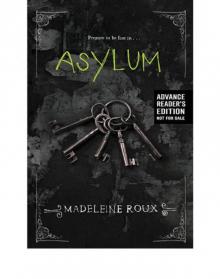 Asylum
Asylum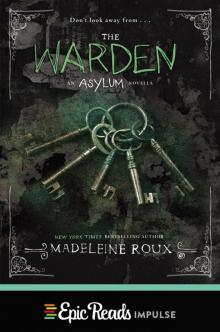 The Warden
The Warden The Bone Artists
The Bone Artists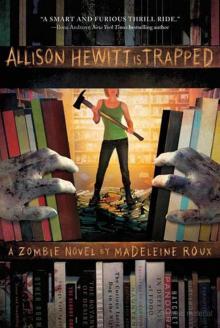 Allison Hewitt Is Trapped
Allison Hewitt Is Trapped Court of Shadows
Court of Shadows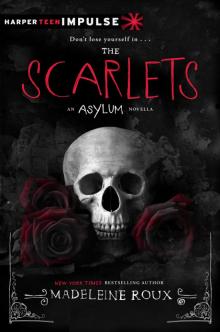 The Scarlets
The Scarlets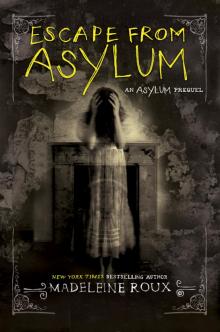 Escape From Asylum
Escape From Asylum The Shining Blade
The Shining Blade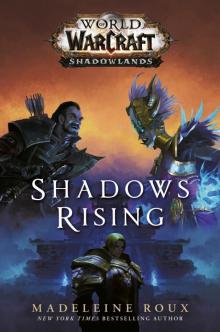 Shadows Rising (World of Warcraft: Shadowlands)
Shadows Rising (World of Warcraft: Shadowlands) Salvaged
Salvaged Sadie Walker Is Stranded
Sadie Walker Is Stranded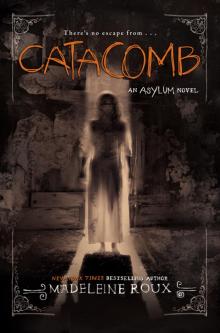 Catacomb
Catacomb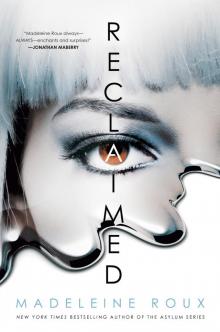 Reclaimed
Reclaimed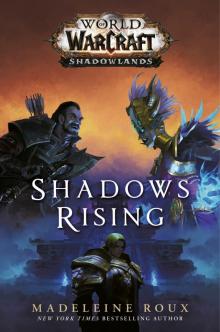 Shadows Rising (World of Warcraft
Shadows Rising (World of Warcraft Tomb of Ancients
Tomb of Ancients